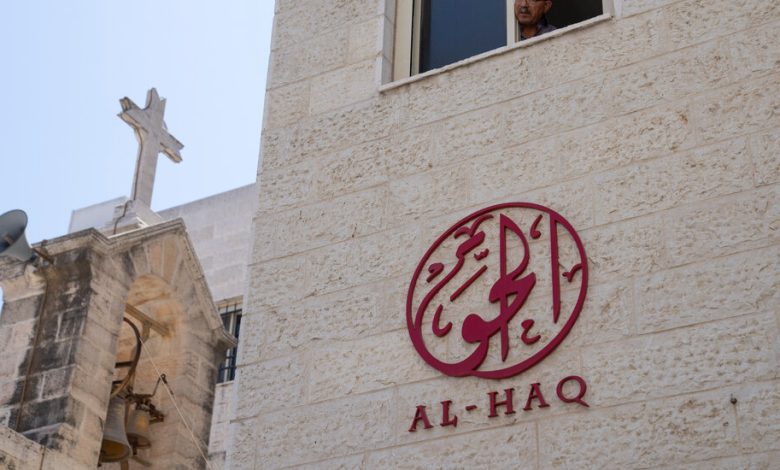We Document Human Rights Violations. Israel Wants to Silence Us.

RAMALLAH, West Bank — Just after 3 a.m. on Aug. 18, Israeli soldiers blasted open the locked doors of Al-Haq, the oldest and largest human rights organization in the occupied Palestinian territories, for which I serve as general director. The soldiers ransacked the administrative and finance departments, the meeting room and my office. When they were done, the soldiers sealed the offices with a reinforced iron door welded into place. On the door, they posted a military order declaring that Al-Haq is an illegal group.
A few hours later, as I took in what was happening, my phone started beeping with messages that soldiers had also invaded and sealed off the offices of six other leading Palestinian organizations, including Defense for Children International-Palestine, the Union of Palestinian Women’s Committees, the Bisan Center for Research and Development and Addameer Prisoner Support and Human Rights Association. This was an escalation in Israel’s campaign against us — last October, it labeled six of our organizations “terrorist” entities and tried to choke off the international funding we receive.
Israel’s attempts to suppress Al-Haq are based on false claims that I am a member of the Popular Front for the Liberation of Palestine, which Israel and the United States consider a terrorist organization. When I was a university student, I was briefly involved in student activities with the Popular Front and in 1985, I was convicted by an Israeli military court of assisting the group. I was imprisoned for nine months.
In the years that followed, while I was working as a field researcher for Al-Haq, I spent a total of about eight years in Israeli prisons without charges or a trial, and endured abuse. And throughout much of the 1990s and for six years after I became the head of Al-Haq in 2006, Israel repeatedly banned me from traveling abroad. This treatment was condemned by Amnesty International, which declared me a prisoner of conscience in 1990, as well as by Human Rights Watch and others.
Israel has refused to provide us with any evidence to support its claim from October that Al-Haq and the other organizations are front groups for the Popular Front for the Liberation of Palestine. In August, The Guardian reported that a classified C.I.A. report that reviewed the evidence supplied by Israel earlier this year had found nothing to validate it. Israel’s persecution of our organizations has been roundly criticized.
Israel clearly aims to discredit and defund Palestinian civil society organizations, especially those that monitor Israel’s abuses of our rights and call for justice. Al-Haq documents violations of the individual and collective rights of Palestinians in the occupied territories, whether committed by Israel or the Palestinian Authority, and presses for accountability. We have made joint submissions to the International Criminal Court to urge an investigation into Israel’s attack on Gaza in May 2021, which killed more than 200 Palestinians, and efforts to evict Palestinian families from their homes in the Sheikh Jarrah neighborhood of occupied East Jerusalem.
In the aftermath of the raid in August, I received a threatening phone call from someone claiming to be from Israel’s domestic spy agency, the Shin Bet. The caller ordered me to present myself at the Ofer military prison for interrogation, and threatened me with imprisonment if I continued my work with Al-Haq. The head of Defense for Children International-Palestine received a similar call. He was detained for two hours by the Shin Bet. I didn’t go.
I don’t take Israel’s threats lightly.
My main concern, however, is not for myself or Al-Haq. It’s about the wider implications the raid has for Palestinian civil society. The organizations targeted by Israel provide vital social services and support to a Palestinian population devastated by more than half a century of brutal Israeli military occupation and colonization by Israeli settlers. Over the past year and a half, leading international and Israeli human rights organizations have joined Palestinians in concluding that the oppressive system Israel has imposed on us amounts to apartheid. Perhaps this is why Israel has intensified its efforts to suppress our work.
So far at least, it has not succeeded. Following Israel’s accusations against us last year, the European Union suspended support for Al-Haq. However, after reviewing our finances, it said that it found no evidence of irregularities and that it would restore our funding. After Israel’s raid on our office, we responded by reopening our doors and resuming our work. We are pushing back with all means at our disposal.
The Israelis are obviously grasping at straws. To justify the closing of our offices, an Israeli delegation reportedly met this month with American officials to present the supposed evidence of wrongdoing. As it reviews this information, the United States must keep in mind that if Israel manages to shut down Al-Haq and the other organizations by eliminating our funding or imprisoning our staff, it will make it harder for Palestinians to find recourse for the injustices they face. It could also embolden Israel to go after other Palestinian rights groups.
The Biden administration must make clear that U.S. support for Israel is not unconditional and that there will be consequences for Israel’s continued violations of Palestinian human rights, including sanctions. Washington and European nations must show that they are serious about supporting human rights and democracy in the Palestinian territories and Israel. Our organizations must be allowed to do their crucial work. Otherwise, it’s only a matter of time before Israel intensifies its repression and finally succeeds in silencing us.
Shawan Jabarin is the general director of the human rights organization Al-Haq.
The Times is committed to publishing a diversity of letters to the editor. We’d like to hear what you think about this or any of our articles. Here are some tips. And here’s our email: [email protected].
Follow The New York Times Opinion section on Facebook, Twitter (@NYTopinion) and Instagram.
